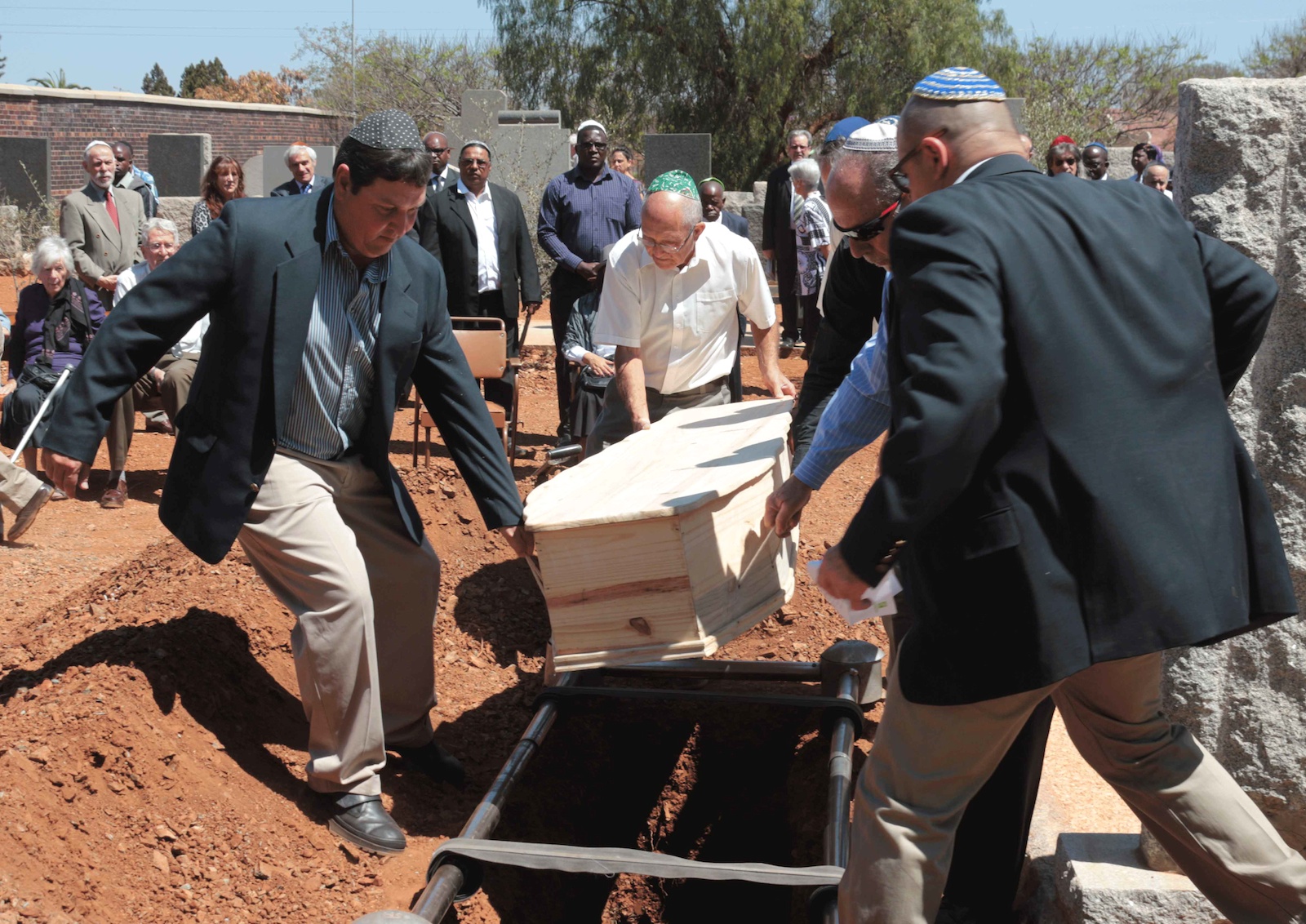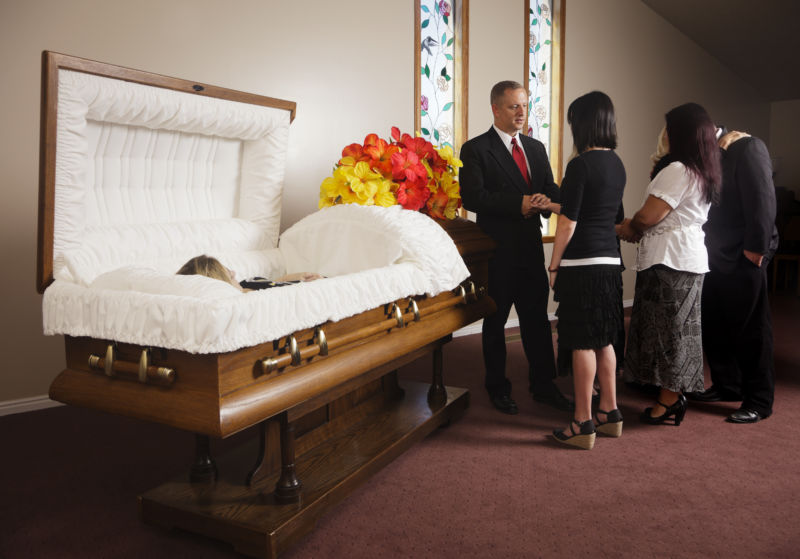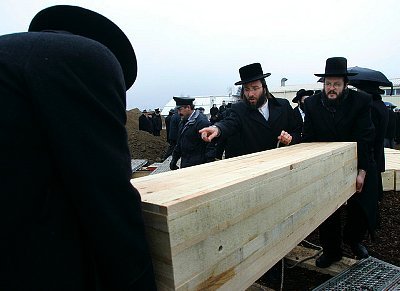jewish funeral customs open casket
Jewish funerals are typically closed casket occasions. It is unacceptable for the casket to be open in Jewish traditions.

Jewish Traditions For Death Burial And Mourning Rohatyn Jewish Heritage
However in some Messianic congregations where Christian traditions are more prevalent the casket is left open.

. In most cases the closed casket is present at the service. No visitation takes place. Caskets used in Jewish funerals are traditionally made of wood.
According to traditional practices the funeral is usually held in a synagogue or funeral home. Male guests are expected to wear a jacket and tie with a yarmulke as a head covering which is available at the funeral home or synagogue. PUBLIC VIEWING OF THE DECEASED Judaism considers it disrespectful to the deceased to have an open casket except for identification.
-During the funeral and services men may be asked to wear a skull cap yarmulke. Open caskets and cremations are traditional in the Jewish way of dying. No Open Casket Aside from the Chevra Kadisha no one really sees the body once it is prepared for the burial.
It begins immediately after the burial and concludes a short time after the morning service Shacharit on the seventh dayMany people change into their non-leather. The Jewish tradition does not generally accept open caskets or cremations. This matter is subject to the wishes of the deceased and his or her immediate family members and the customs of the congregation.
When the Mourner is a Kohen According to the Torah a Kohen descendants of Aaron the high-priest is not permitted to come in contact with a deceased b ody. Visit us Online for more info. It is also possible to delay the funeral for a few days until important family members arrive.
Here are a few common Jewish burial customs and Jewish death rituals. Typically your first step would be to contact the local synagogue rabbi or a funeral home. Also because flowers are meant for joyous occasions they do not belong on the casket.
An open casket or cremation is not generally accepted in the Jewish tradition. Jewish law is also subject to local laws. In order not to disturb the natural decomposition of the body the coffin is made of simple wood.
While some cultures really value this final opportunity to see the deceased its seen as disrespectful in Judaism. As such Jewish funeral etiquette also differs. Et Jewish tradition mandates that ostentation should be avoided.
The body is washed and placed in a simple coffin. This may include cosmetics manipulations and even embalming. To have an open casket usually the mortician must do something to the body to make it presentable.
The dress and behavior of family and friends should reflect the dignity and solemnity of the occasion. A Jewish funeral differs in many ways from a Christian funeral and that of other religions and cultures. It is also forbidden to hold an open casket viewing.
Burial Most of the funeral service happens at the graveside. A traditional Jewish funeral is generally simple and very brief and is held only a day after the death has occured. As such rules about embalming grave liners and other regulations that are in place for public health must be followed.
This is considered extremely disrespectful to the deceased. Women wear conservative apparel a skirt or dress of somber colors but they are not expected to wear a head covering. Shiva meaning seven refers to the seven-day period of formalized mourning by the immediate family of the deceasedJewish law prescribes that one observe shiva for a parent sibling child or spouse.
To honor the deceased the casket remains closed with friends and family prohibited from seeing the person who has passed. Often Jewish burial caskets are purchased within the local faith community. Jewish Burial Customs A few notable Jewish burial traditions affect the planning and coordination when laying a loved one to rest.
For instance there is no viewing. It is customary to make a donation in the name of the deceased to a worthy charity or. Jewish funerals typically are conducted in a synagogue or a funeral home and are led by a rabbi.
Family and friends are not allowed to see the person before burial. A yarmulke-covered jacket and tie is required for men attending a funeral. Wearing a jacket and tie and wearing a yarmulke when they leave the service along with a head covering.
Jewish tradition maintains that vanity and pride are out of place in the funeral. An open casket during the funeral is forbidden because it is seen as disrespectful to the body or met which is also not to be enhanced with cosmetics. A Jewish funeral service differs from other funerals you may have attended in some key ways.
The order of the service in the chapelsanctuary. Taharah Ta-ha-rah the traditional washing and dressing of the deceased with dignity. -There will be no open casket as per Jewish custom.
Visiting with and viewing of the remains open casket are contrary to Jewish law. Aron A-rone the burial casket. Bodies arent to be embalmed and the casket is rarely opened again once its closed.
These are examples of religious head coverings available at the funeral homes and synagogues. The rabbis at the local synagogue will generally have resources for purchasing a casket locally as will most funeral directors and funeral homes. Our affordable services include all licenses permits fees.
Jewish funeral customs during the service. Open caskets and visitations arent permitted so there are some exceptions. -Flowers should not be brought or sent to a Jewish funeral.
4 A Recent Trend Supports an Ancient Tradition. Open caskets are not permitted at Jewish funerals. Open Casket at Funerals In general all traditional Jewish funeral homes are well aware of the importance of a quick and proper Jewish burial and a equipped to handle it even on a days notice.
Additionally one way to ensure a proper Jewish burial is to contact a Jewish funeral home andor Rabbi to make the arrangements earlier. Judaism takes seriously the injunction in Torah that Dust you are to dust you shall return Gen 319 Additionally we believe that we are created btzelem Elohim in the image of God. In Jewish tradition there is no viewing or open-casket portion of the event.
Ad More and more families are saving thousands choosing cremation over high cost funerals.

Pin On Post Mortem Photography Ancient Vintage

Closed Caskets At Jewish Funerals Jewishboston

Open Casket Funerals Common Questions Answered Lovetoknow
Caskets Star Of David Memorial Chapels

Why Don T Jews Have Open Casket Funerals Death Mourning

10 Tips For Attending A Jewish Funeral Unusual Headstones Funeral Etiquette Jewish

Awesome 21 Funeral Flowers From Interflora Https Ideacoration Co 2017 11 16 21 Funeral Flowers In Casket Flowers Memorial Flowers Funeral Flower Arrangements

Casket Plans Free Online Casket Wood Casket Funeral Caskets

Open Casket Vs A Closed Casket Funeral The Fundamental Information T Trusted Caskets

Now Even Funerals Are Livestreamed And Families Are Grateful Ars Technica

Unitarian Universalist Funeral Customs Unitarian Universalist Unitarian Chalice

The Difference Split Vs Full Couch Casket Funeral Help Center
Complete Guide To Jewish Orthodox Burial Rituals And Caskets Trusted Caskets

Complete Guide To Jewish Orthodox Burial Rituals And Caskets Trusted Caskets




